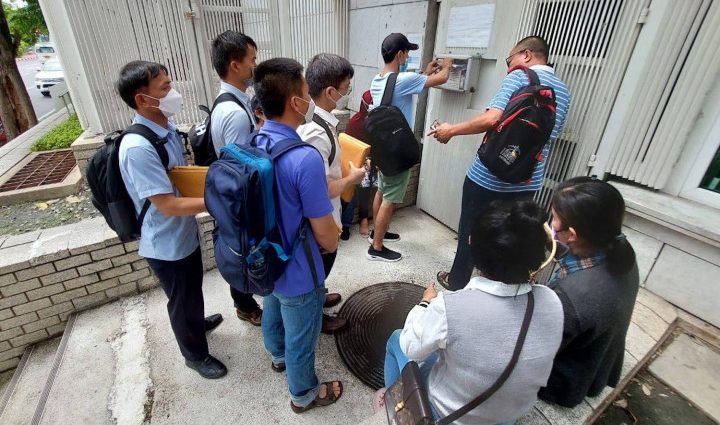Self-exiled group arrested in Pattaya for overstaying visas fears deportation

More than 60 self-exiled Chinese Christians who were arrested in Pattaya for overstaying their visas are now at a police facility in Bangkok awaiting the authorities’ next move.
Human rights organisations are appealing to Thailand not to deport the 32 adults and 31 children who belong to the Shenzhen Holy Reformed Church, saying they would face persecution in China.
The group was arrested at a resort in Pattaya on Thursday and detained overnight. The 32 adults appeared in court in Pattaya and were each fined 1,500 baht for overstaying their visas.
Two American citizens who have been helping the group were briefly held but not placed under arrest, said Pol Col Thawee Kudthalaeng, chief of the Nong Phrue police station.
He said the Chinese group would likely not be deported back to China.
“No, there won’t be that thing. It’s not going to happen,” he told BenarNews.
“We did not charge all of them because there were children as well. They were charged with overstaying their visas, staying too long and not renewing their visas.”
Thailand is not a signatory to the 1951 Refugee Convention, but the non-refoulement principle under international human rights law states that people cannot be sent back to a country where they are likely to be persecuted, tortured, mistreated or have their human rights violated.
After the court appearance, the group members were placed in two buses to be driven to Bangkok.
A drive that would normally take two hours took closer to five because the passengers forced the buses to stop. They got out by the roadside, saying they feared they were being driven to Suvarnabhumi airport to be repatriated, The Associated Press reported.
Only after receiving reassurances by phone did the group continue their journey, arriving early Saturday morning at Royal Thai Police Sports Club on Vibhavadi Rangsit Road, which has space for large numbers of detainees.
The main immigration detention centre on Soi Suan Phlu off Sathon Road, where some detainees including many Uyghurs fleeing China have languished for years, is notoriously overcrowded.
The members of the Shenzhen Holy Reformed Church, also called the Mayflower Church, came to Thailand in 2022 from Jeju in South Korea, where they had been staying since fleeing China in 2019. They submitted applications for asylum to the UN High Commissioner for Refugees in Bangkok in September last year.
Deana Brown, an American who is attempting to help the group relocate to Tyler, Texas, said that renewing their visas to stay in Thailand could be difficult or even dangerous.
She told The AP that when the Chinese exiles had sought to renew their Thai visas, they had been told they had to first report to their country’s embassy.
“We knew [then] that nobody could get their visas,” Brown said.
Christians in China are legally allowed to worship only in churches affiliated with Communist Party-controlled religious groups, but the authorities have largely tolerated unregistered “house churches”. They have tens of millions of worshippers, possibly outnumbering those in the official groups.
In recent years, however, house churches have come under heavy pressure, with many prominent ones shut down.
Human Rights Watch issued a statement on Saturday appealing to the Thai government not to repatriate the group.
“Thai authorities need to recognise the grave dangers facing Christians back in China and under no circumstances force them to return,” said Elaine Pearson, the New York-based organisation’s Asia director.
“If Thailand determines that the 63 Christian Chinese cannot stay, then they should be permitted to seek protection in another country,” she said. “Rights-respecting governments should urgently step up to express their willingness to receive these asylum seekers at risk.”
The press section at the Chinese Embassy in Bangkok did not answer its telephone and the embassy did not immediately respond to an emailed request for comment from The AP.
The US Embassy said it had no immediate comment on the case.

